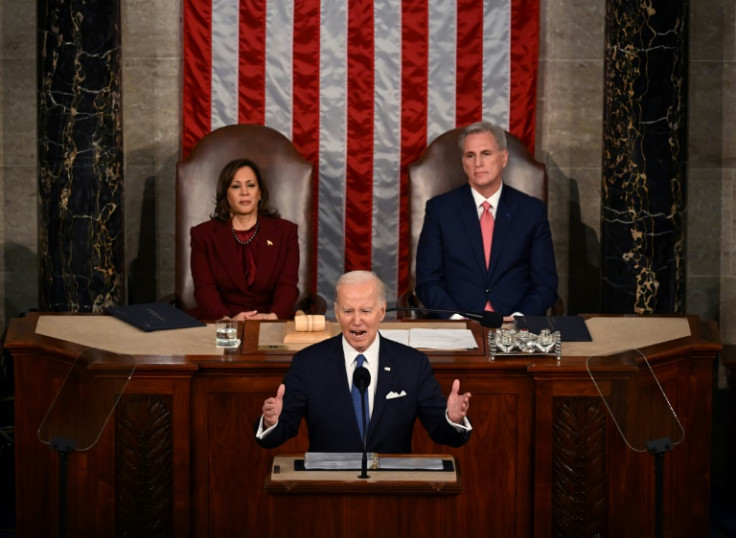US President's Annual Address An Exhausting 'Super Bowl,' Speechwriters Say

When US President Joe Biden gives his State of the Union speech on Thursday, it will be the culmination of three months' intensive work for his speechwriters.
"The State of the Union is the speech that every speechwriter dreams of writing -- and then once they've done it, they never want to do it again," says Terry Szuplat, a former speechwriter for Barack Obama.
"It's arguably one of the highest profile speeches that a president gives all year. So it would seem to be a tremendous opportunity, and yet at the very same time, it rarely, if ever changes the fundamental dynamics of a presidency."
Biden will emerge this week after three days secluded at the Camp David presidential retreat in the hills of Maryland working on the final draft of the primetime televised speech.
This year could be his most important yet. Seeking reelection in November in a likely rematch against Donald Trump, he will seek to convince voters worried about his age and wars in Gaza and Ukraine, while touting his achievements on the economy.
The speechwriters' work likely began in October or November of 2023, when they started harvesting ideas from across government departments and holding budget meetings, says Sarada Peri, another former Obama writer.
A first draft normally emerges before Christmas "but then they would really start in earnest again once we came back from the holidays and it's incredibly stressful" she said.
The task, she added was to "try to weave them into some kind of narrative with an arc, some kind of story that will be compelling to the American people."
For Peri, the State of the Union is simultaneously a career pinnacle and an endurance test.
"It's sort of a speechwriters' Super Bowl and yet, the outcome is never exactly what you want it," she said, referring to the championship game of the American Football season.
The speech itself has its roots in the US Constitution, which says that the president shall "from time to time give to the Congress information of the State of the Union."
George Washington, the first US president, got away with the shortest speech to date, at 1,000 words -- a contrast with Biden's 9,000 words last year.
Washington's successors were usually content to give Congress written messages and it wasn't until Woodrow Wilson in 1913 that the current ritual began of the president making his way from the White House to the Capitol to make an annual speech.
"We don't have a king, but in that moment, when the president enters and the president's name is called, it is a very regal moment," said Szuplat, whose book on speechwriting, "Say It Well," is due to be published in September.
"There's also the dynamic of half of the room applauding and standing up, while the other half of the room stays seated with their hands in their laps and it can make for compelling television," he said.
Barack Obama tried to keep his speech down to 30 minutes but to no avail, said Szuplat, noting "the pressures are just so great."
The challenge is always to cover the endless list of policy areas, from health to education to foreign policy and beyond.
"Every year, we would say, 'okay, this is a year we're going make it shorter," said Sarada Peri. "And of course, inevitably, by the end it has become a speech that was at least an hour long."
Last year Biden spoke for 70 minutes. The record was set in 2000 by former president Bill Clinton, at one hour and 28 minutes.
Writers admit that often it's the unscripted moments that stick in people's memory.
In 2020, then-House speaker Nancy Pelosi, a Democrat, famously ripped up a copy of Republican president Donald Trump's State of the Union speech.
Peri recalls Biden's off the cuff ripostes last year to opposition lawmakers who interrupted his speeches. "I think he did a great job of really turning it into a moment for himself."
Szuplat meanwhile recalls the long standing ovation that Congress gave in January 2014 to a service member who was gravely injured in Afghanistan.
"Those are the moments that tend to stay with people, that they're talking about the next day at work, with their families," said Szuplat.
Come Thursday when Biden gives his State of the Union, the two writers say they will watch the speech without a tinge of nostalgia for their old jobs.
"I am happy to be a spectator," quips Peri.
© Copyright AFP 2025. All rights reserved.





















